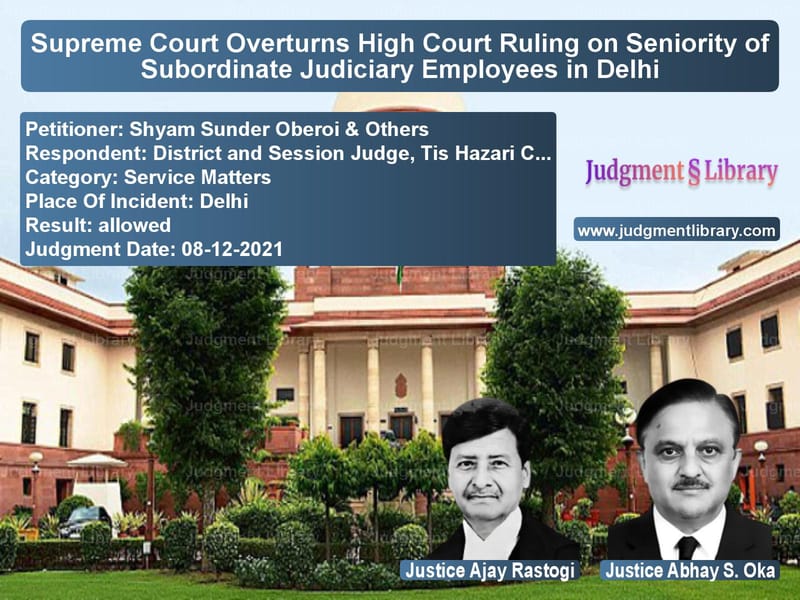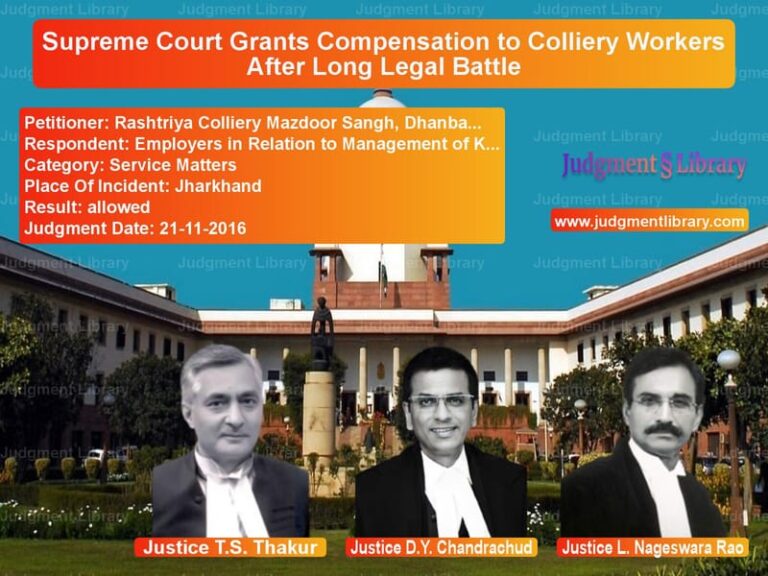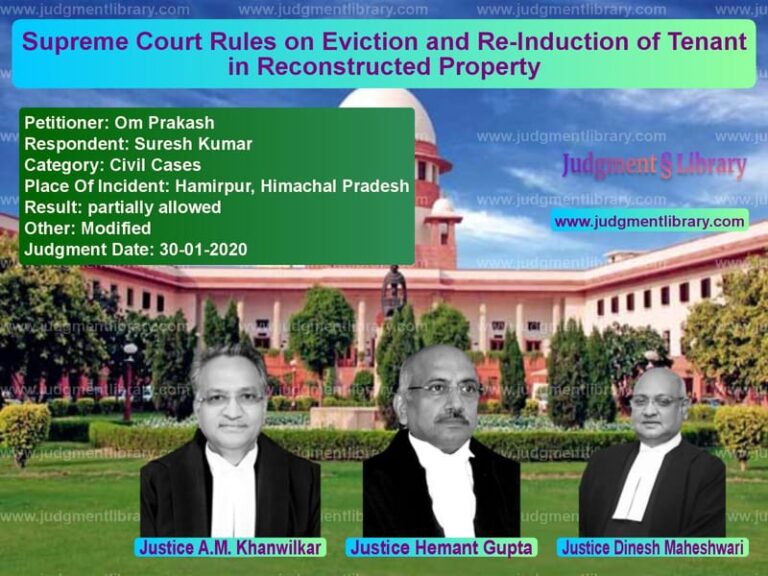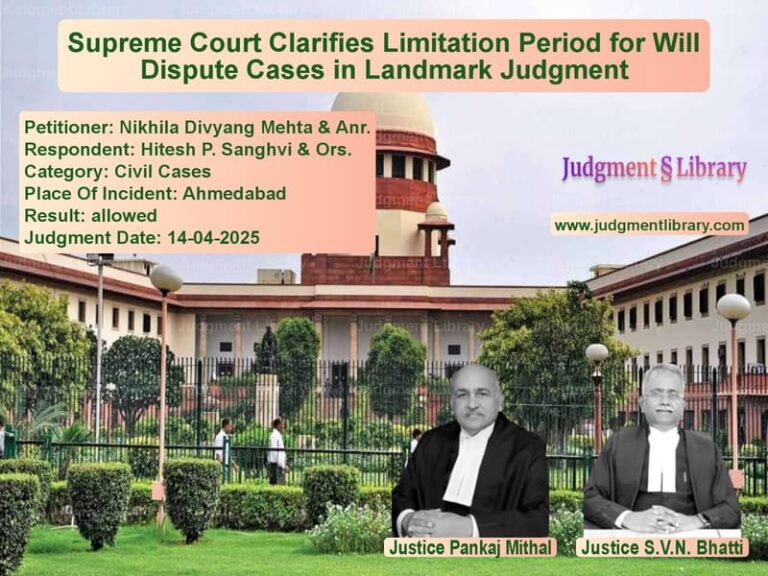Supreme Court Overturns High Court Ruling on Seniority of Subordinate Judiciary Employees in Delhi
The Supreme Court of India recently delivered a critical judgment in the case of Shyam Sunder Oberoi & Others vs. District and Session Judge, Tis Hazari Court, Delhi & Others. The case revolved around the seniority dispute of employees working as Lower Division Clerks (LDC) in the subordinate judiciary of Delhi. The apex court set aside the Delhi High Court’s Division Bench decision, which had granted seniority to ad-hoc appointees over regularly recruited employees. This judgment upholds the principle that substantive appointees should not be placed below ad-hoc employees who were later regularized.
Background of the Case
The appellants, Shyam Sunder Oberoi and others, were substantively appointed as LDCs in 1987 after undergoing a regular recruitment process, including a written and typing test. On the other hand, the respondents were initially appointed as ad-hoc LDCs between 1983 and 1989. Over time, their ad-hoc service was extended, and they sought regularization.
During the pendency of litigation filed by the respondents in 1990 (Civil Writ Petition No. 1820/1990), an interim order was passed by the Delhi High Court on August 20, 1992, protecting their seniority against 180 candidates awaiting appointment. Subsequently, the High Court allowed them to appear only for a typing test, exempting them from the written examination. Eventually, they qualified and were regularized by an order dated November 17, 2000, from the date of their initial ad-hoc appointment.
Legal Proceedings and High Court Rulings
The regular LDCs, including the appellants, challenged the November 17, 2000, order in Civil Writ Petition No. 7462/2000 before the Delhi High Court. A Single Judge ruled in their favor on March 10, 2015, holding that while the respondents were entitled to regularization, they could not claim seniority over those appointed substantively through regular selection.
However, the respondents appealed, and a Division Bench of the High Court reversed the ruling on December 6, 2018. The Division Bench relied on the interim order of August 20, 1992, to conclude that the ad-hoc appointees were entitled to seniority from their initial appointment, thereby placing them ahead of the appellants.
Arguments Before the Supreme Court
Appellants’ Arguments:
- The appellants argued that the respondents were initially ad-hoc employees and only became eligible for regularization after clearing the typing test in 1992 or later.
- They contended that granting seniority from the date of initial ad-hoc appointment was unjustified as they had not undergone the full selection process, including the written test.
- The reliance on the 1992 interim order was misplaced, as it only protected seniority against the panel of 180 candidates but did not establish any rights over substantive appointees.
Respondents’ Arguments:
- The respondents maintained that their continuous ad-hoc service should be counted for seniority, as they had been regularized from the date of initial appointment.
- They relied on the 1992 and 1994 High Court orders that exempted them from the written test and led to their eventual regularization.
- They contended that the Division Bench of the High Court rightly upheld their seniority over the appellants.
Supreme Court’s Observations
The Supreme Court examined the issue of seniority in the absence of explicit rules governing it within the Delhi subordinate judiciary. The key observations were:
- Substantive Appointments Take Precedence: The Court held that employees who were appointed through a regular selection process must be placed above those who initially joined on an ad-hoc basis and later regularized.
- Ad-hoc Service Cannot Confer Seniority: The Court reiterated the principle that ad-hoc appointments, extended over time, do not grant seniority unless explicitly provided for in the rules.
- Misinterpretation of the 1992 Interim Order: The Supreme Court found that the High Court’s Division Bench had erroneously interpreted the August 20, 1992, order, which was meant to protect the respondents’ seniority only in relation to the 180 candidates in the selection panel and not against regularly appointed candidates.
- Exemption from Written Test Not Equivalent to Regular Selection: The Court noted that the respondents were exempted from the written test but were later required to qualify a typing test, which they did in 1992 or later. This meant they did not meet the same criteria as the appellants, who underwent the full recruitment process.
Final Judgment
The Supreme Court allowed the appeal and set aside the Delhi High Court’s Division Bench ruling. The key directives of the judgment were:
- The respondents’ regularization from the date of their initial ad-hoc appointment would remain valid, but it would not entitle them to seniority over the appellants.
- The seniority list must reflect that regularly appointed employees would rank above those who were initially ad-hoc and later regularized.
- The judgment of the Single Judge, which had quashed the High Court’s order granting en-bloc seniority to the respondents, was restored.
Key Takeaways
- Seniority Must Follow Regular Appointment: This judgment reaffirms that employees recruited through a proper selection process hold precedence over those who enter service through ad-hoc appointments.
- Government Orders Must Align with Rules: The ruling highlights that any decision regarding seniority must be based on statutory provisions and not merely on administrative orders or court interim reliefs.
- Misinterpretation of Judicial Orders Can Be Rectified: The Supreme Court clarified that previous judicial orders must be read in context and should not be used to grant undue advantage.
- Fair Employment Practices Upheld: The decision ensures that employees who go through a rigorous selection process are not unfairly disadvantaged in career progression.
This ruling sets an important precedent in service law, reinforcing the supremacy of merit-based recruitment in determining seniority and ensuring equitable treatment in government employment.
Petitioner Name: Shyam Sunder Oberoi & Others.Respondent Name: District and Session Judge, Tis Hazari Court, Delhi & Others.Judgment By: Justice Ajay Rastogi, Justice Abhay S. Oka.Place Of Incident: Delhi.Judgment Date: 08-12-2021.
Don’t miss out on the full details! Download the complete judgment in PDF format below and gain valuable insights instantly!
Download Judgment: shyam-sunder-oberoi-vs-district-and-session-supreme-court-of-india-judgment-dated-08-12-2021.pdf
Directly Download Judgment: Directly download this Judgment
See all petitions in Promotion Cases
See all petitions in Public Sector Employees
See all petitions in Recruitment Policies
See all petitions in Judgment by Ajay Rastogi
See all petitions in Judgment by Abhay S. Oka
See all petitions in allowed
See all petitions in supreme court of India judgments December 2021
See all petitions in 2021 judgments
See all posts in Service Matters Category
See all allowed petitions in Service Matters Category
See all Dismissed petitions in Service Matters Category
See all partially allowed petitions in Service Matters Category







